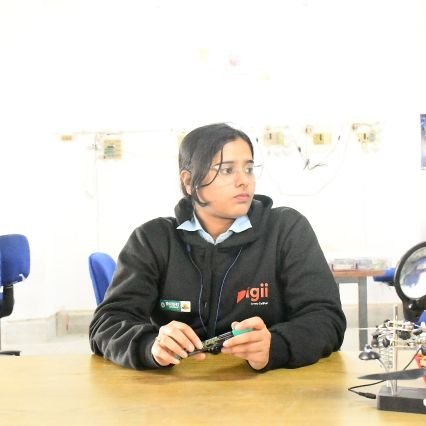
Hala Alkhellow
@halakhellow
Full-Stack Developer
You might like
Hello everyone, I'm excited to share with you my new article on Medium where I explained dynamic programming and its implementation on the Fibonacci problem, using memoization and tabulation techniques: medium.com/@halakhellow/d… Happy reading :) #100daysofcoding #100daysofcode
Day 62 of #100daysofcoding challenge. KMP search pattern is used to improve the worst case in naive search complexity from O(nm) time to O(m + n) where n is the length of the string, and m is the length of the pattern. Read more: geeksforgeeks.org/kmp-algorithm-… #coding #100daysofcode

Day 61 of #100daysofcoding challenge. Naive pattern searching is the simplest method among other pattern-searching algorithms. This algorithm is helpful for smaller texts. It does not need any pre-processing phases. Reference: geeksforgeeks.org/naive-algorith… #coding #100daysofcode

Day 60 of #100daysofcoding challenge. In-place algorithm means that the algorithm doesn't use extra space for input manipulation. It practically overrides the input with the output. Here you can find examples of it: geeksforgeeks.org/in-place-algor… #coding #100daysofcode

Day 59 of #100daysofcoding challenge. Stability means that equivalent elements retain their relative positions, after sorting. Here's a detailed image of when to consider an algorithm as a stable one. Reference: geeksforgeeks.org/stable-and-uns… #coding #100daysofcode

Day 58 of #100daysofcoding challenge. An online algorithm is one that can process its input in the order that the input is fed to the algorithm. Read more about this type of algorithms: geeksforgeeks.org/online-algorit… #coding #100daysofcode

Day 56 of #100daysofcoding challenge. The Dependency Inversion Principle is a specific methodology for loosely coupling software modules. A detailed explanation of it: youtube.com/watch?v=9oHY5T… #coding #100daysofcode

Day 55 of #100daysofcoding challenge. The interface Segregation Principle states that no code should be forced to depend on methods it does not use. See how to implement this with JavaScript: youtube.com/watch?v=JVWZR2… #coding #100daysofcode

Day 54 of #100daysofcoding challenge. Before discussing the fourth principle of SOLID principles, we need first to understand the difference between composition and inheritance. Look at the picture below to understand more 👇 #coding #100daysofcode

Day 53 of #100daysofcoding challenge. Liskov Substitution Principle enables us to replace objects of a parent class with objects of a subclass without breaking the application. A great code explanation for this principle: youtube.com/watch?v=dJQMqN… #coding #100daysofcode

Day 52 of #100daysofcoding challenge. Open/Closed Principle: open for extension, but closed for modification. To help understand this principle more, see this video about it: youtube.com/watch?v=-ptMtJ… #coding #100daysofcode

Day 51 of #100daysofcoding challenge. Single Responsibility Principle: this principle states that each class should have one responsibility, one single purpose. See an example: geeksforgeeks.org/single-respons… #coding #100daysofcode

Day 50 of #100daysofcoding challenge. SOLID Principles are five principles of Object-Oriented class design. They are a set of rules and best practices to follow while designing a class structure. Will discuss and explain each one separately in the upcoming days. #100daysofcode

Day 49 of #100daysofcoding challenge. Dependency Injection pattern is a creational design pattern in which an object or function receives other objects or functions that it depends on. #coding #100daysofcode

Day 48 of #100daysofcoding challenge. Object pool pattern is a software creational design pattern which is used in situations where the cost of initializing a class instance is very high. A detailed explanation of using it: egghead.io/blog/object-po… #coding #100daysofcode

Day 47 of #100daysofcoding challenge. The factory pattern is a creational design pattern that uses factory methods to create objects — rather than by calling a constructor. Simple JavaScript example of using factory pattern: medium.com/@thebabscraig/… #coding #100daysofcode

Day 46 of #100daysofcoding challenge. The builder design pattern is a creational pattern that enables you to construct complex objects simply and more declaratively. A good implementation: youtube.com/watch?v=McF9ak… #coding #100daysofcode

Day 45 of #100daysofcoding challenge. Prototype Creational Design Pattern: creates new objects, but rather than creating non-initialized objects it returns objects that are initialized with values it copied from a prototype. Read more: patterns.dev/posts/prototyp… #100daysofcode

Day 44 of #100daysofcoding challenge. Object.create() method is used to create a new object with the specified prototype object and properties. See the syntax in the picture below 👇 #coding #100daysofcode

United States Trends
- 1. Penn State 23.8K posts
- 2. Indiana 39.5K posts
- 3. Mendoza 20.9K posts
- 4. Gus Johnson 7,140 posts
- 5. Heisman 9,272 posts
- 6. #UFCVegas111 5,898 posts
- 7. Iowa 20.4K posts
- 8. #iufb 4,377 posts
- 9. Sayin 69.9K posts
- 10. Mizzou 4,134 posts
- 11. Omar Cooper 9,996 posts
- 12. Beck 7,482 posts
- 13. Oregon 33.8K posts
- 14. Cam Coleman N/A
- 15. Estevao 42.7K posts
- 16. Josh Hokit N/A
- 17. Kirby Moore N/A
- 18. Sunderland 156K posts
- 19. Jim Knowles N/A
- 20. Texas Tech 14.2K posts
Something went wrong.
Something went wrong.






























































